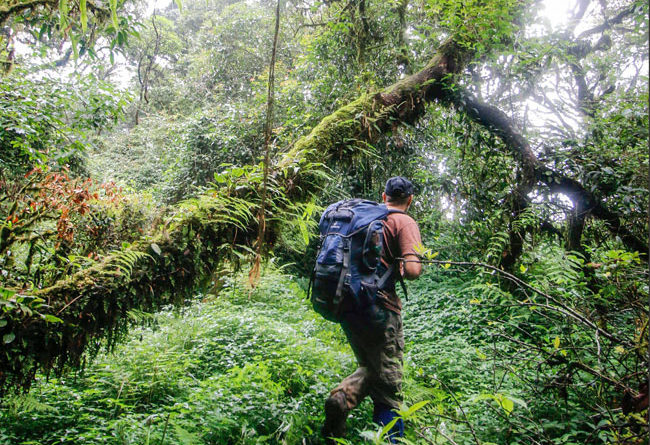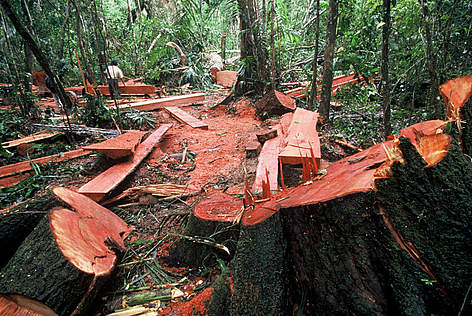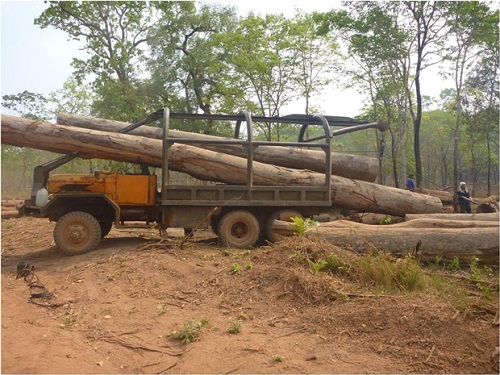With Its Environmental Crisis, Is Laos Missing The Forest For The Trees?
Source: The Diplomat
Laos’ reputation as having some of the most lush and diverse forests in the Mekong remains under serious threat after a December investigation by government officials found evidence of large-scale illegal logging operations in the southern Attapeu province, despite recent efforts to end the practice. Laos, which is left with just 40 percent of the country covered by closed canopy forests, is facing an environmental crisis with much of the remaining forests unhealthy and degraded.
The extent of deforestation across Laos has been obscured by the rise in illegal logging, despite reported efforts to reverse the destruction in recent years. A 2015 study from the World Wildlife Fund revealed the true extent of the illegal logging trade, with exports to China and Vietnam reaching 1.4 million cubic meters in 2013, environmental news website Mongabay reported, a figure four times above the national quota and falling just short of 10 times the registered annual haul. Mongabay cited Global Forest Watch figures which showed 191,031 hectares of forests had disappeared from Laos in 2014, a huge rise on the 80,543 lost in 2008.
The WWF report pointed to the two neighboring countries as the largest influences on the industry, saying that illegal logging will likely continue with demand so high and the governments of the two countries turning a blind eye to illegal import practices.
“The high dependence of China and critical dependence of Vietnam on timber supply from Laos makes it unlikely that the governments of these countries are ready to take steps to control import legality. Almost all of this import value is likely generated by natural timber as [Laos] plantations produce very limited volumes of high-value hardwood,” the report said, as reported by Mongabay.
But meeting overseas demand is just half the story, with experts suggesting widespread infrastructure development – much needed in the country which often tops lists of the region’s poorest – has come with little oversight allowing for unnecessary deforestation as part of land-clearings for mines, dams and roads.
Whole areas of forests have been lost to the industry, with the report finding the provinces of Saravan and Sekong had been completely destroyed. The destruction has stressed flora and fauna, much of which is endemic to the Mekong region or, in the case of hardwoods, is particularly targeted. The unregulated industry is also ripe for labor exploitation and workplace safety concerns.
The huge industry has proved so vital to Laos and the region it now plays a role in how the country deals with neighbors, with many commentators pointing to illegal timber as a major cause in last year’s long-running spat between Laos and Cambodia.
Laos Prime Minister Thongloun Sisoulith had announced a ban on illegal timber exports heading to Vietnam in mid-2016. While this had the effect of cutting imports heading across the border in early 2017 to almost a tenth of what it had been a year earlier, it is widely speculated this impact is only on paper. Instead, loggers are believed to be using Cambodia to get around the local ban where a similar ban has been less successfully enforced.
The ban from Thongloun is one factor in a slew of measures aimed at stamping out the practice which have met varying degrees of success. Widespread corruption is largely considered to the biggest roadblock to fully ending illegal logging. The extent of corruption in the industry was revealed in May 2017 when the wife of Attapeu province Governor Nam Viyaketh, Seng Viyaketh, was arrested after allegedly trying to take illegally logged timber across the border into Vietnam.
Seng Viyaketh vehemently denied the charges to Radio Free Asia, who followed the case closely, but authorities were determined to make an example of the pair. An investigation by RFA found witnesses who suggested corruption is rampant in Attapeu province, where loggers can pay up to US$60,000 per truck to take timber out of the province.
For environmental activists and Laotians keen to see the forests which once blanketed the country return, reforestation is a Herculean task. The government’s ambitious target of increasing forests from 42 percent to 65 percent coverage by 2020 are likely to fall short, with locals telling RFA provincial targets are repeatedly failing by huge margins citing a lack of funding and labor. A Ministry of Agriculture and Forestry official told RFA continued illegal logging is offsetting efforts to reforest.
J&C Services, an independent insurance broker and a Top Gold agent of Toko Assurance in Laos, is offering customer-specific solutions to our clients, while providing at the same time the most competitive premiums.
Try us and be surprised how much we differ if compared to other providers !
www.jclao.com / info@jclao.com / 020 77 100 200



